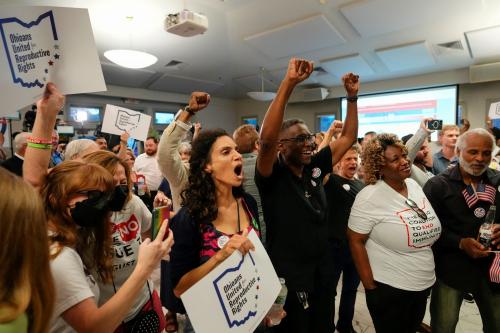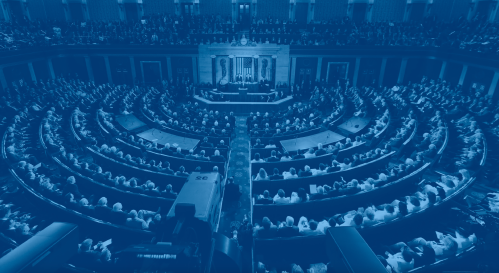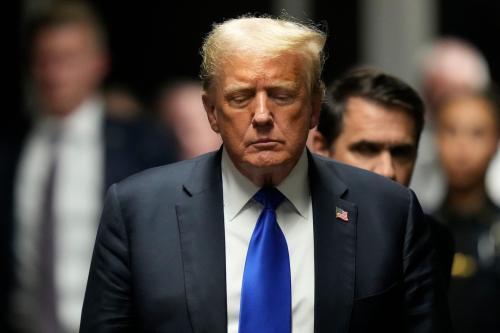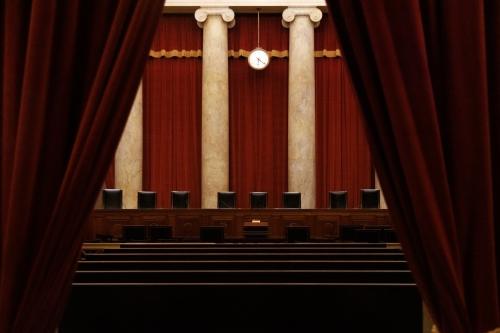This is an adaptation of a Brookings model prosecution memo addressing the question of removal.
About 18 hours after Fulton County District Attorney (DA) Fani Willis revealed the indictment of former president Donald Trump, his ex-White House Chief of Staff Mark Meadows, and 17 others, Meadows attempted to remove his prosecution from Georgia state to federal court. The case has been assigned to U.S. District Court Judge Steve Jones, who on Wednesday, ruled he has jurisdiction and set an expeditious hearing for August 28th at which Meadows can present evidence and legal argument to support his position. The DA can do the same at the hearing to oppose, and her written brief in response to the removal petition is due on August 23rd.
So how likely is it that Meadows will succeed? A look at the applicable law suggests that he will have a very steep hill to climb if he is to be successful in removing the case. In this analysis, we explain why.
In their request for removal, Meadows’ lawyers argue that because the charges against him concern his tenure as Trump’s Chief of Staff, the Constitution’s Supremacy Clause entitles him to remove the case to federal court. According to his attorneys, the conduct that DA Willis cites in the indictment, including “contacting state officials on the President’s behalf,” falls within the normal scope of Meadows’ duties in the White House.
But the background law is not favorable to these claims. That is because the allegations and the public record suggest that Meadows’ conduct — namely, his own and his support of Trump’s pressuring of election officials in Georgia — was political in nature and not one that was, or could ever be, undertaken in an official White House Chief of Staff capacity.
To explain why, let’s take a look at the law.
Under Section 1442(a), “any officer … of the United States” may remove to federal court a criminal action brought against them in state court if the prosecution is “for or relating to any act under color of such office.” This law is “designed to provide federal officials with a federal forum in which to raise defenses arising from their official duties.”1 Under Section 1442(a), removal is authorized if the defendant is an “officer of the United States” and has “raise[d] a colorable federal defense.”2 The requirement of a “colorable federal defense” has been given a “broad reading” and does not require the defendant to prove the “ultimate validity” of his defense “at the time of removal.”3
A federal official is not immune from state criminal prosecution “simply because of his office and his purpose,” but instead must meet two conditions:4 1) the federal official must have been engaged in conduct authorized by federal law or the Constitution; and 2) the official must have done no “more than what was necessary and proper” to effectuate his federal duty.5
In other words, a federal officer must actually act pursuant to federal authority, and their conduct must bear an objectively reasonable relationship to achieving a federal goal.
Meadows appears to have no “colorable federal defense” based on the Supremacy Clause or otherwise to support removal. For that to be the case, Meadows would in essence need to prove that overturning the results of a lawful election might possibly be defined under the law as a legitimate federal goal. Simply put, the executive branch has no role to play in counting or tabulating ballots — or certifying results — in presidential elections. As one federal judge recently found in a related context while denying absolute immunity to Trump, “President Trump cites no constitutional provision or federal statute that grants or vests in the President (or the Executive Branch) any power or duty with respect to the Certification of the Electoral College vote … That is because there is none.”6 Of course, Meadows was part of the very executive branch to which the judge was referring.
U.S. District Judge Alvin Hellerstein recently echoed this point in denying Trump’s removal request in connection with his ongoing prosecution in New York state: “Not every act of or on behalf of a federal officer is an act under color of office.” Like other courts, to consider the question, the U.S. Court of Appeals for the 11th Circuit — the federal court with jurisdiction over federal cases brought in Georgia and that would be hearing this matter on any appeal — has additionally recognized that an officer who acts out of “any personal interest, malice, actual criminal intent, or for any other reason than to do his duty” will have no entitlement to such immunity.
Because neither the Constitution nor applicable federal statutes vest the president with any official responsibility here, Meadows’ repeated interference with the administration of the Georgia election took him outside the perimeter of his office (and past the scope of authorized official acts). There are good, self-evident reasons why our legal system does not give the sitting president (or officers in the executive branch he oversees) a role in counting, tabulating, or certifying the election for his successor — an election in which the sitting president may be a candidate.
And here is where the conduct of attempting to overturn a lawful election went even beyond that. Indeed, the allegations here illustrate the reasons that we don’t want — and the law does not allow — presidents and their chiefs of staff officially to engage in state electoral activity.
The DA’s allegations and the public record evidence overwhelmingly suggest that this was a political act on behalf of a failed candidate and not a set of activities that were — or could ever be — even colorably undertaken in an “official” capacity, as removal requires. Any claim that what Meadows did was in furtherance of official federal business, rather than in pursuit of personal political gain, is unlikely to stand.
-
Footnotes
- Farm City Insurance Co. v. Johnson, 190 F. Supp. 2d 1232, 1235 (D. Kan. 2002).
- Mesa v. California, 489 U.S. 121 (1989); Jefferson County v. Acker, 527 U.S. 423 (1999)
- See Winters v. Diamond Shamrock Chem. Co., 149 F.3d 387, 398, 400 (5th Cir. 1998) (citing Murray v. Murray, 621 F.2d 103, 107 (5th Cir. 1980); then quoting Willingham v. Morgan, 395 U.S. 402, 407 (1969)); Magnin v. Teledyne Continental Motors, 91 F.3d 1424 (11th Cir. 1996) (holding that “defense need only be plausible; its ultimate validity is not to be determined at the time of removal”).
- Although Trump may additionally argue that he is absolutely immune from prosecution by virtue of the acts having taken place during his presidency (a claim without merit, as described in Eisen et al. at 183, there is no authority for the proposition that executive branch officials could conceivably claim similar constitutional protection.
- Baucom v. Martin, 677 F.2d 1346, 1350 (11th Cir. 1982).
- Thompson v. Trump, No. 21-cv-00400, 2022 WL 503384, at *14 (D.D.C. Feb. 18, 2022) (emphasis added).









Commentary
Why Mark Meadows’ removal bid is an uphill climb
August 17, 2023